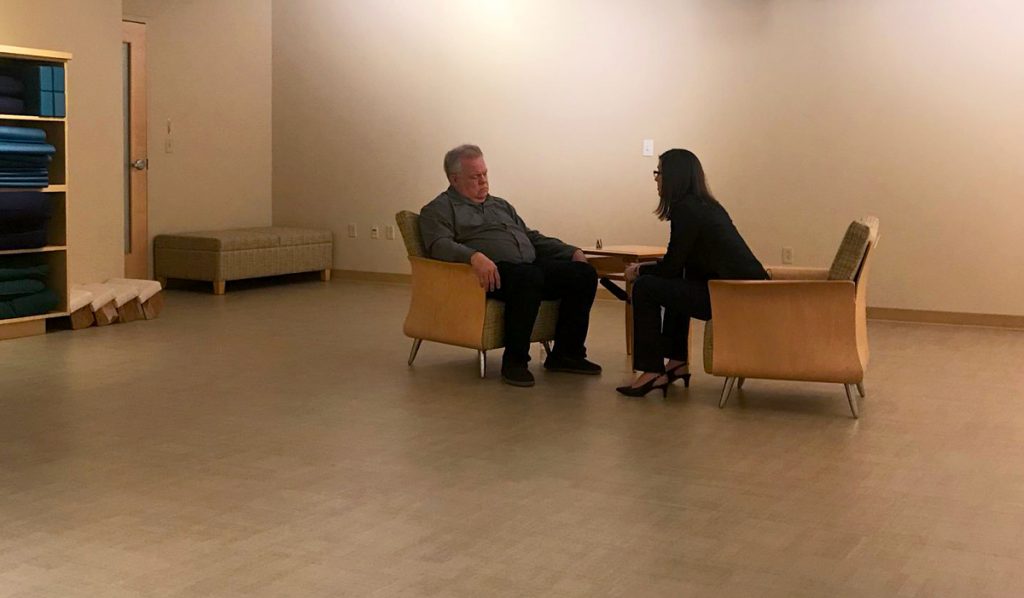“There are a lot of myths about hypnosis, but ultimately, it’s a tool. It helps people cultivate skills that already exist within them,” says Lindsey McKernan, Ph.D., licensed clinical psychologist at Vanderbilt’s Osher Center for Integrative Medicine.
For over ten years, McKernan has used psychosocial treatments, including hypnosis to help patients across a variety of health contexts. Hypnosis can help patients manage chronic conditions, such as interstitial cystitis. It can also help manage acute pain, and alleviate patient anxiety about upcoming dental, cancer or surgical procedures—improving outcomes.
McKernan has now focused her efforts on patients with chronic pain, launching a clinical trial comparing individual and group hypnosis approaches. “This trial is partly out of necessity—our wait list for one-on-one hypnosis keeps growing. A group setting, if validated, could help us reach more patients.” In addition, McKernan oversees general hypnosis services at the Osher Center for those struggling with specific complaints, such as dysphagia.
Structured Interventions
The trial applies a group hypnosis protocol in which up to 12 patients meet together weekly for structured sessions. Others meet weekly for one-on-one sessions at Osher. In total, 60 patients will participate for eight weeks. Participants are followed for six months after completing the treatment to assess maintenance of treatment gains. McKernan will compare treatment benefits for those participating in group treatment versus individual treatment.
McKernan and colleagues measure changes in patients’ pain intensity each week using the Brief Pain Inventory. The trial, already underway, is expected to build on promising evidence that suggests hypnosis can deliver meaningful pain relief for most people.
Although data are yet to be analyzed, said McKernan, “Anecdotally, participants have been enjoying the program and feeling more in control of their pain.”
Dispelling Myths
The initial session simply helps a person feel what hypnosis is like for the first time, McKernan said. “A lot of patients come in with ideas about hypnosis, but really, it’s something you need to experience.”
During hypnosis, McKernan guides participants into a deeply relaxed state and offers suggestions for alterations in moods, thoughts or behaviors that are tailored to patient needs and treatment goals. The remainder of the session is spent talking about the experience, and ways to incorporate hypnosis as one of many skills to reduce pain.
“The ultimate goal is for patients to learn how to practice hypnosis independently, long after treatment concludes.”
“Hypnosis is not a quick fix where I can remove a symptom or habit,” McKernan said. Each session is recorded and provided to patients for (ideally) daily practice between appointments. “It requires quite a bit of practice, and over time, patients begin to manage their own symptoms through self-hypnosis. The ultimate goal is for patients to learn how to practice hypnosis independently, long after treatment concludes.”
McKernan emphasizes the empowering effect of hypnosis. “One of the biggest myths patients have is that they’ll be completely out of control. The truth is they are in control the entire time. They can open their eyes at any point—each session is a collaboration,” McKernan said.
Expanding Access
In addition to the trial, McKernan runs the hypnosis program at Osher and leads a two-year, training program for providers based on The Oxford Handbook of Hypnosis.
Every fall, Osher also hosts an intensive CME-approved weekend workshop for community health providers, NPs, psychologists, psychiatrists, physicians, social workers, dentists and providers-in-training on how to integrate hypnosis into their clinical services. Workshop participants then continue with McKernan for follow-up training and supervision throughout the year.
“Our goal is to develop regional competency in hypnosis, which is important because comprehensive training programs are rare,” McKernan said. “We are constantly working to expand our reach.”





